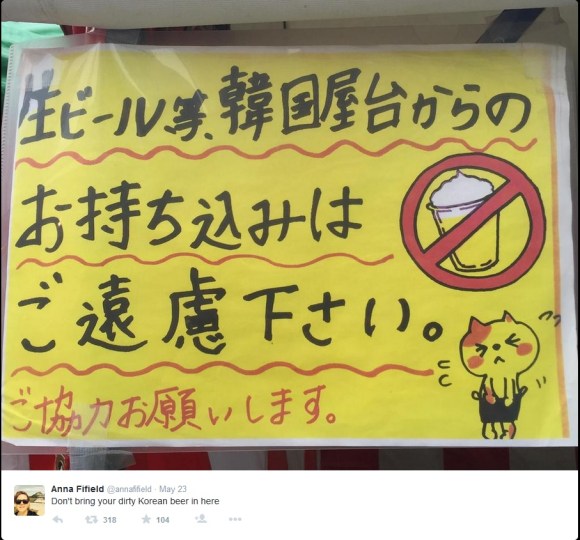
There’s a reason I don’t write for the Washington Post. Actually, there are about a thousand reasons, almost all of which pertain to my own ineptness. Another one these reasons is that I occasionally write some embarrassing joke that gets completely misunderstood and blows up in my face.
So, I can relate on some level to the Washington Post’s writer and Tokyo bureau chief Anna Fifield. Her tweet, which jokingly translated a customer request sign as “Don’t bring your dirty Korean beer in here,” has led to some considerably harsh feedback from Japanese Twitter users.
The sign, photographed in Shingawa Station, literally reads: “Don’t bring in beer etc. from Korean food stands please. Thank you for your cooperation” alongside a picture of a glass of beer with way too much head and a “no” sign overlaid. In keeping with municipal signage laws, there’s also a cute little calico cat that apparently needs to pee.
Commenting on the image in her tweet, Fifield seemingly made the “dirty Korean beer” remark as a joke about how Korean food stalls were pointedly singled out in the sign’s message.
At first the joke drew several puzzled and angry responses from people who didn’t seem to get her intent.
Like anyone, Fifield was not happy with being labeled a “loudspeaker which promotes discrimination arbitrarily,” and replied.
Despite this explanation, the angry tweets continued to flood in, and Fifield took a startling amount of flack, much of which appeared to be coming from people concerned about the exact kind of discrimination Fifield herself was alluding to in her original tweet.
Of course the million-dollar question here is why the pictured sign mentions Korean food stands in particular. There is the possibility this establishment is run by some Archie Bunker-style bigot, but there are also many other potential reasons.
Perhaps this vendor had chronic problems exclusively with a specific nearby Korean stall’s customers. Many Twitter users said that Korean tourists are often unaware of the impoliteness of taking food from one restaurant into another. I’m not sure if that’s true or not, but it still doesn’t really explain the logic of the sign.
If the sign was meant to warn Korean visitors, however, then it should probably be written in Korean or at least English rather than just making a vague reference to Korean food stalls. And so, the mystery of why it was written like that remains unknown.
Even so, some criticized Fifield for not asking the sign’s owner about its true meaning.
Others just didn’t care.
Much of the criticism seemed focused on the use of the word “dirty” to describe the “Korean beer” – a word that was not used on the sign to begin with. Granted, when looking at the word in its strict meaning of either “polluted” or “immoral” it sounds a lot harsher than it might to a native English speaker used to such cliches.
On the other hand, that doesn’t really excuse the remark either. It could also be easily misinterpreted online in Korea in the same literal way and spread around as a false example of Japanese discrimination “as reported by a member of the Washington Post”. This is also a point which Fifield quickly addressed.
In the end, I suppose this serves as a reminder that we must all watch what we say online, because we never know when our words will be misinterpreted or our intentions misunderstood.
I’m just glad none of my bombed jokes were about international relations and instead all focused on things like escalator etiquette and moronic YouTubers.
Source: Twitter, Togetter (English/Japanese)